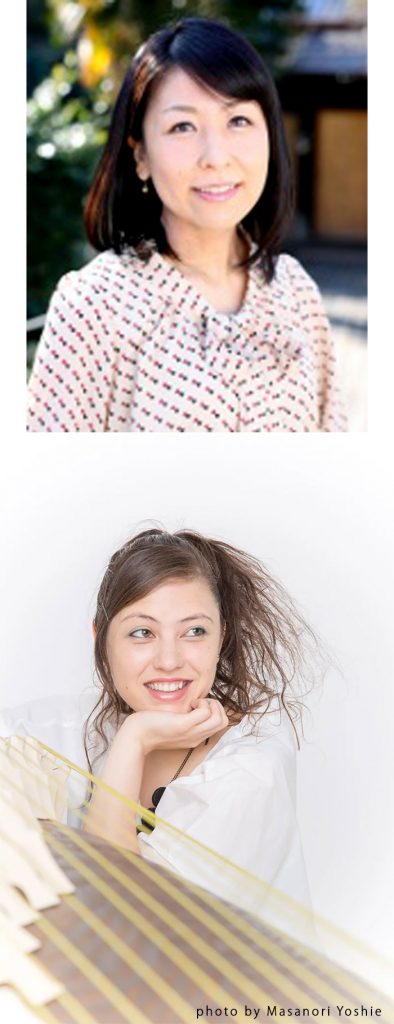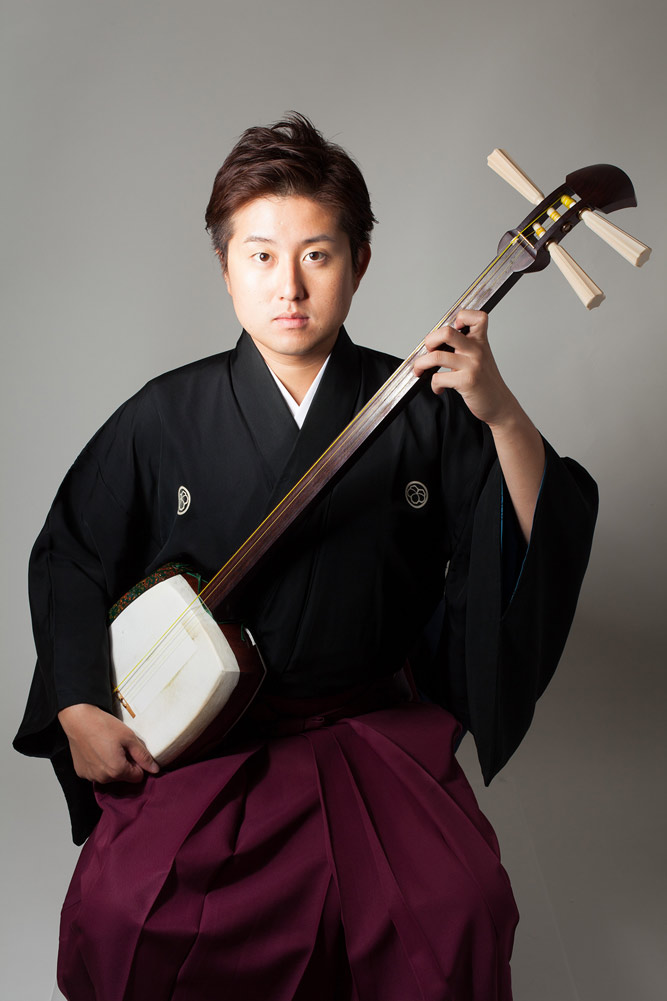TEACHERS
EVENT #6 APRIL/MAY 2024
THE VOICE WITHIN JAPANESE CULTURE, MUSIC & SHAKUHACHI TRADITION
#6.1 JUNKO UEDA
Junko Ueda (b.Tokyo) is a Japanese singer / satsuma-biwa player, presenting Japanese traditional biwa story-telling music and shōmyō Buddhist chant.
Ueda studied satsuma-biwa with the famous Kinshi Tsuruta, shōmyō Buddhist chant with Kôshin Ebihara (Tendai-school) and composition at the Tokyo College of Music (under Reiko Arima, Jôji Yuasa, a.o.).
She has been presenting numerous concerts, shōmyō vocal workshops and collaborations (e.g. with flutist Wil Offermans; cellist Yo Yo Ma; the Dutch Nieuw Ensemble; Lyonnaise progressive rock band PoiL and composers Jean-Claude Eloy, Akemi Naito, Keiko Harada). Her traditional biwa CDs Heike Monogatari (CD650 VDE/AIMP Geneva) and Satsuma Biwa (ARN64577 Arion, Paris) received several prizes e.g. the Grand Prix du Disque, Academie Charles Cros, Paris and Choc Le Monde de la Musique, France.
She has released her solo CDs of shōmyō Buddhist chant titled Meditative Flowers and Kujō-Shakujō (E-records, Granada, Spain).
www.junkoueda.com

#6.2 TERUO FURUYA
Teruo Furuya is one of the most respected shakuhachi performers in Japan today. He studied shakuhachi at the Tokyo Gakugei University and NHK Traditional Music Conservatory. In 1969 he became a student of the legendary Katsuya Yokoyama (1934–2010) and studied and worked with him for more than 40 years.
Since the 70s Furuya has performed regularly in Japan and widely internationally. He has participated in all the World Shakuhachi Festivals, often not only as an invited player but also as an organiser or adviser. He also was part of the ESS Summer Schools in France (2007) and Germany (2014).
Currently Teruo Furuya is the director and chief instructor of Kokusai Shakuhachi Kenshūkan founded by Katsuya Yokoyama in 1988. He is also head of Chikushinkai Tokyo and taught at the NHK Traditional Music Conservatory and the Tokyo Gakugei University.
Furuya has recorded many CDs, recently e.g. three honkyoku solo CDs (2013-2015) and Modan Vol.1 (2014) and Vol.2 (2016) a collaboration with the composer Keisuke Doi. He also appears on numerous CD and DVD recordings with Katsuya Yokoyama.
www.furuya108.com

#6.3 SHINO ARISAWA + MIYAMA McQUEEN-TOKITA
Dr. Shino Arisawa is an Associate Professor at the Graduate School of Education at Tokyo Gakugei University. She received her doctoral degree in Ethnomusicology from the School of Oriental and African Studies (SOAS), University of London with the thesis Changes in the Transmission of ‘Traditional’ Music: The Case of Japanese Jiuta-Sōkyoku. Prior to her current position, Arisawa was a Post-Doctoral Research Associate at SOAS, where she also taught Japanese music courses in the Department of Music.
Miyama McQueen-Tokita is a Tokyo-based koto and bass koto player. Her practice re-imagines the vocabulary and tradition of Japanese music in the contemporary context of improvisation and experimental music. With the occasional addition of voice and electronics, Miyama’s work as a composer and interpreter speaks beyond her foundation in hogaku and experimental music, with influences ranging from Kazue Sawai to Meredith Monk.
As a featured soloist and collaborator with ensembles such as the Vancouver Symphony Orchestra and Australian Art Orchestra, Miyama’s ability to exist in multiple musical worlds is a defining aspect of her musical identity. Her debut solo album “SONOBE”, released in 2020, features new and existing works for the koto by composers from all around the world.
In 2019 she spent six months in NYC as a grantee of the Asian Cultural Council New York Fellowship, where she immersed herself deeply in the experimental, free improvised and new music scenes. Miyama has been taught by Satsuki Odamura and Kazue Sawai.

#6.4 KINZABURO ABE
Kinzaburo Abe has been involved in the performing arts since childhood, and at just 12 years old, he took over the title of Natori (Master) of the Takahashi school and took on the name ‘Kinzaburo’. In 2005 he won the National Tsugaru Shamisen Competition at the age of 20, becoming the 8th National Champion.
This led to a release of two original CDs with his brother, Zero (2005) and Ichi (2010). They collaborated with the Japanese drum group Oni Daiko and participated in a tour around Taiwan, making a name for themselves throughout the country. Abe not only has performed in Japan but also in more than 15 countries internationally.
In 2011, his folk song drama Min’yō Kouro – Minamikaze ni Onoe was received great acclaim, and the following year, in 2012, it was performed in six cities in the United States: Los Angeles, Portland, Denver, Hawaii, Seattle, San Francisco, and UCLA. He hold Tsugaru-shamisen folk song workshops at the University of California (University of California, Los Angeles) and the University of Hawaii, to great acclaim. He also composed the entrance music for the 2023 World Swimming Championships.
www.abeya36.com/english
.

#6.5 ANNE NORMAN
Anne Norman is a passionate shakuhachi performer, improviser and composer working as soloist and in collaboration with a diverse range of musicians and other artists.
Based in Melbourne, Anne has composed works for shakuhachi, various ensembles and choirs and performed in festivals across Australia as well as concerts in Europe, America and Japan. Anne majored on flute before taking up shakuhachi in Kobe, then Osaka and on scholarship at Tokyo University of the Arts.
Her knowledge of Western flute repertoire and training in traditional Zen, classical and contemporary Japanese genres have combined with studies in ethnomusicology and various cross-cultural music collaborations, resulting in Anne’s unique voice on shakuhachi.
Anne’s teachers include Nakamura Shindo (Ueda-ryū); Tajima Tadashi (Watazumi-do); Yamaguchi Goro (Kinko-ryū).

